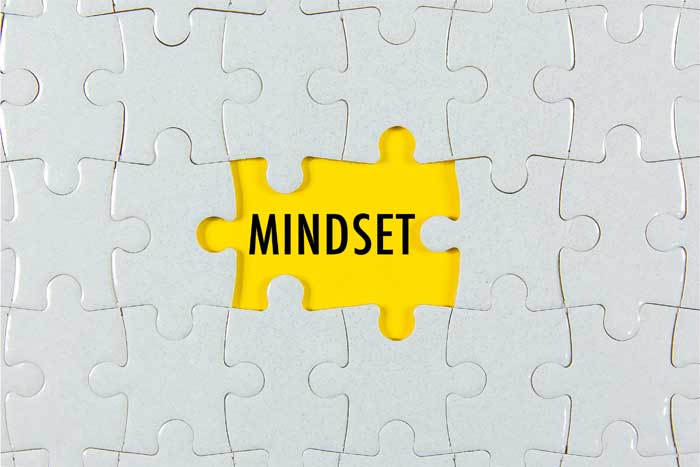Having the proper mindset is so important because it will influence how you approach your dreams, how you learn, accomplish your goals, and lead others. Below are some of the ways in which mindset relates to success, goals, confidence, and more.
- Mindset and success: This mindset delves into the relationship between mindset and achieving success. It explores how adopting a growth mindset, embracing challenges, and maintaining a positive outlook can contribute to personal and professional success.
- Mindset and learning: Mindset plays a crucial role in learning and education. This topic explores how different mindsets influence the learning process, academic performance, and the development of skills and knowledge. It can include strategies for fostering a growth mindset in educational settings.
- Mindset and resilience: Resilience is the ability to bounce back from setbacks and adversity. This topic examines the connection between mindset and resilience, exploring how a growth mindset can enhance resilience, help individuals overcome challenges, and adapt to change.
- Mindset and goal setting: The mindset we adopt significantly impacts how we set and pursue our goals. This topic explores how different mindsets influence goal setting, motivation, and perseverance. It can include strategies for setting realistic goals, overcoming obstacles, and staying focused.
Hi I’m Roxell!
Your Injury Attorney, Business Mentor, and Teacher
- 5. Mindset and self-confidence: Mindset influences self-confidence and self-belief. This topic delves into how a growth mindset can enhance self-confidence, foster a belief in one’s abilities, and enable individuals to take on new challenges with courage and conviction.
- 6. Mindset and leadership: Leadership requires a particular mindset that inspires and empowers others. This topic examines the role of mindset in effective leadership, including the importance of a growth mindset in leading teams, embracing innovation, and creating a culture of continuous learning.
- 7. Mindset and happiness: Mindset affects our overall well-being and happiness. This topic explores how adopting a positive and growth-oriented mindset can contribute to a sense of fulfillment, satisfaction, and happiness in life.
Types of mindsets?
There are various topics that revolve around mindset and can be explored in-depth. Here are some mindsets to provide a starting point for exploring mindset-related concepts as you focus on your development journey.
- Growth mindset: This mindset focuses on the belief that abilities and intelligence can be developed through effort, learning, and perseverance. It involves cultivating a mindset that embraces challenges, learns from failures, and seeks continuous improvement.
- Fixed mindset: In contrast to a growth mindset, a fixed mindset refers to the belief that abilities and intelligence are fixed traits that cannot be changed. This topic explores the limitations and negative consequences of a fixed mindset and ways to shift towards a growth mindset.
- Positive mindset: A positive mindset revolves around maintaining an optimistic outlook, emphasizing positive thinking, and approaching challenges and setbacks with resilience and a solution-oriented mindset. It involves developing a positive attitude and cultivating gratitude.
How to develop a growth mindset?
Developing a growth mindset is a valuable mindset that can help you embrace challenges, persist in the face of obstacles, and ultimately achieve greater success. Understand the difference between a growth mindset and a fixed mindset: A growth mindset is a belief that your abilities and intelligence can be developed through dedication, effort, and learning. A fixed mindset, on the other hand, is the belief that your
abilities and intelligence are fixed traits that cannot be changed. Recognizing the difference between the two is the first step towards developing a growth mindset.
Here are some steps you can take to develop a growth mindset:
- Embrace challenges: Instead of shying away from challenges or difficulties, see them as opportunities for growth. Challenges can help you learn new skills, gain experience, and develop resilience. Embrace the mindset that challenges are chances to improve and expand your abilities.
- View failures as learning experiences: Instead of being discouraged by failures, see them as valuable learning opportunities. Understand that setbacks and mistakes are part of the learning process. Analyze your failures, identify areas for improvement, and make adjustments to your approach. The focus should be on the progress and lessons gained from the experience, rather than dwelling on the failure itself.
- Cultivate a love for learning: Develop a curiosity and thirst for knowledge. Seek out opportunities to learn and acquire new skills. Emphasize the process of learning rather than solely focusing on the end result. Engage in activities that challenge you intellectually and encourage continuous growth.
- Adopt a positive attitude: Cultivate a positive and optimistic attitude towards your abilities and potential. Believe in your capacity to learn and improve. Replace negative self-talk and self-doubt with positive affirmations and encouragement. Surround yourself with positive and supportive people who believe in your growth.
- Practice perseverance and resilience: Developing a growth mindset requires persistence and resilience. When faced with obstacles or setbacks, don’t give up easily. Instead, view them as temporary hurdles that can be overcome with effort and determination. Keep pushing forward, stay motivated, and learn from the challenges you encounter.
- Embrace feedback: Seek feedback from others and be open to constructive criticism. Feedback provides valuable insights into areas where you can improve and grow. Instead of taking feedback personally, see it as an opportunity for self-improvement and development.and improve. Replace negative self-talk and self-doubt with positiveaffirmations and encouragement. Surround yourself with positiveand supportive people who believe in your growth.
- Practice perseverance and resilience: Developing a growth mindset requires persistence and resilience. When faced with obstacles or setbacks, don’t give up easily. Instead, view them as temporary hurdles that can be overcome with effort and determination. Keep pushing forward, stay motivated, and learn from the challenges you encounter.
- Embrace feedback: Seek feedback from others and be open to constructive criticism. Feedback provides valuable insights into areas where you can improve and grow. Instead of taking feedback personally, see it as an opportunity for self-improvement and development.
- Set goals and track progress: Set realistic and achievable goals for yourself. Break them down into smaller milestones and track your progress along the way. Celebrate your achievements, no matter how small, and use them as motivation to keep growing.
How to improve your mindset?
- Practice self-awareness: Start by developing self-awareness to identify your current mindset and thought patterns. Notice the thoughts and beliefs that may be holding you back or causing negative emotions. Pay attention to your self-talk and the language you use to describe yourself and your situations. This awareness lays the foundation for making positive changes.lays the foundation for making positive changes.
- Challenge negative thoughts: Once you become aware of negative thoughts or limiting beliefs, challenge them. Question their validity and consider alternative perspectives. Replace negative thoughts with positive, empowering ones. For example, if you catch yourself thinking, “I can’t do it,” reframe it as, “I can learn how to do it with practice and effort.”
- Cultivate positivity and gratitude: Focus on cultivating a positive mindset by practicing gratitude. Regularly take time to reflect on the things you are grateful for in your life. This can shift your focus towards the positive aspects and help you develop a more optimistic outlook.
- Surround yourself with positive influences: Surround yourself with people who have a positive mindset and inspire you. Seek out supportive and encouraging individuals who believe in your growth and development. Limit exposure to negative influences such as toxic relationships, negative media, or self-defeating conversations.
- Continuous learning and personal growth: Make a commitment to lifelong learning and personal growth. Engage in activities that expand your knowledge, develop new skills, and challenge you intellectually. This can include reading books, taking courses, attending workshops, or seeking out mentors who can guide and inspire you.
- Practice mindfulness and meditation: Incorporate mindfulness and meditation practices into your daily routine. These practices can help you develop a greater sense of present-moment awareness, reduce stress, and cultivate a more positive help you develop a greater sense of present-moment awareness,reduce stress, and cultivate a more positive and focused mindset.Even a few minutes of daily meditation or mindfulness exercises can make a significant difference.
- Set realistic goals and take action: Set specific, realistic goals that align with your values and aspirations. Break them down into smaller, actionable steps. Taking consistent action towards your goals builds confidence, reinforces a growth mindset, and helps you make progress.
- Embrace failure and learn from setbacks: See failures and setbacks as learning opportunities rather than personal flaws. Embrace the lessons and insights gained from these experiences. Analyze what went wrong, adjust your approach, and keep moving forward. Remember, setbacks are stepping stones to growth and success.
- Practice self-care: Take care of your physical, mental, and emotional well-being. Engage in activities that rejuvenate and energize you, such as exercise, healthy eating, quality sleep, and engaging in hobbies or activities you enjoy. When you prioritize self-care, you are better equipped to maintain a positive mindset.
- Seek support when needed: Don’t hesitate to seek support from trusted friends, family members, or professionals when needed. Sometimes, talking through your thoughts and challenges with others can provide valuable insights and guidance.
Improving your mindset is a continuous journey that requires patience and consistent effort. Be kind to yourself, celebrate your progress, and embrace the process of growth and development. This is why here at excel, we focus on mindset through our mentorship, giving you at least 1 mindset workshop per month. Our mentorship is free with the purchase of any of our products Click here to check out our courses.





